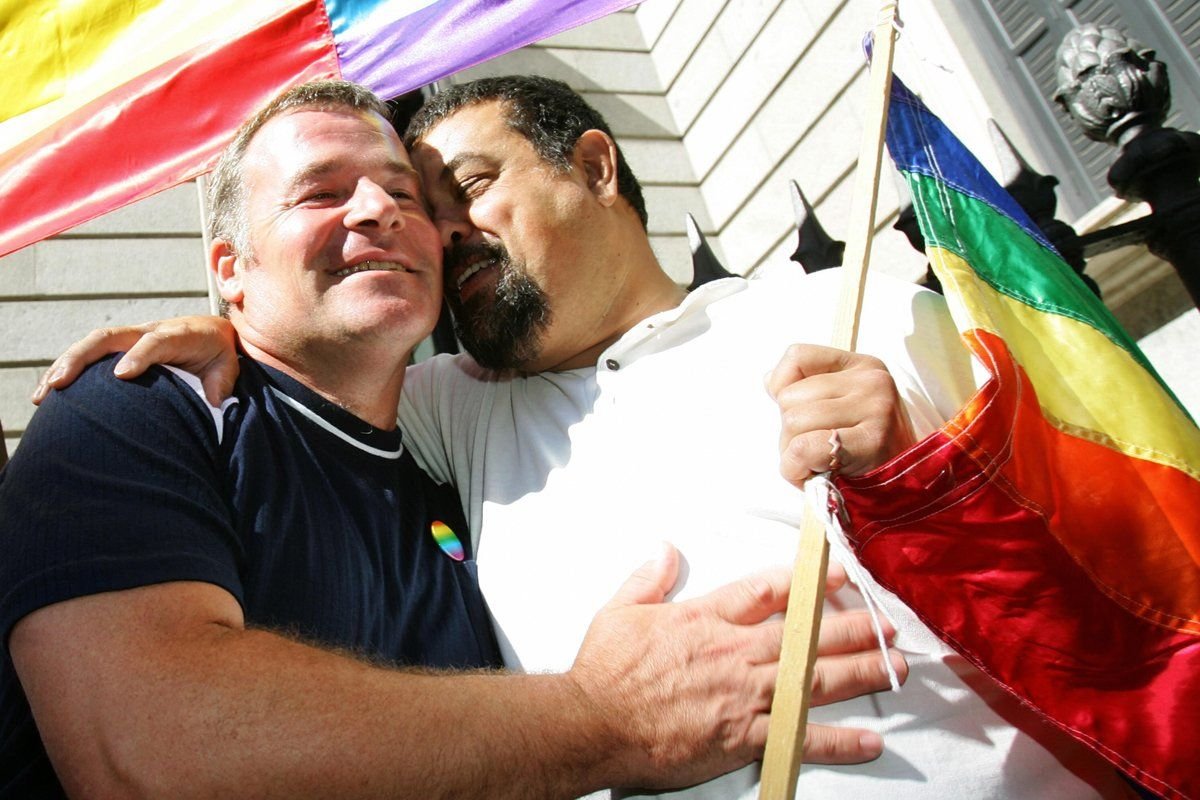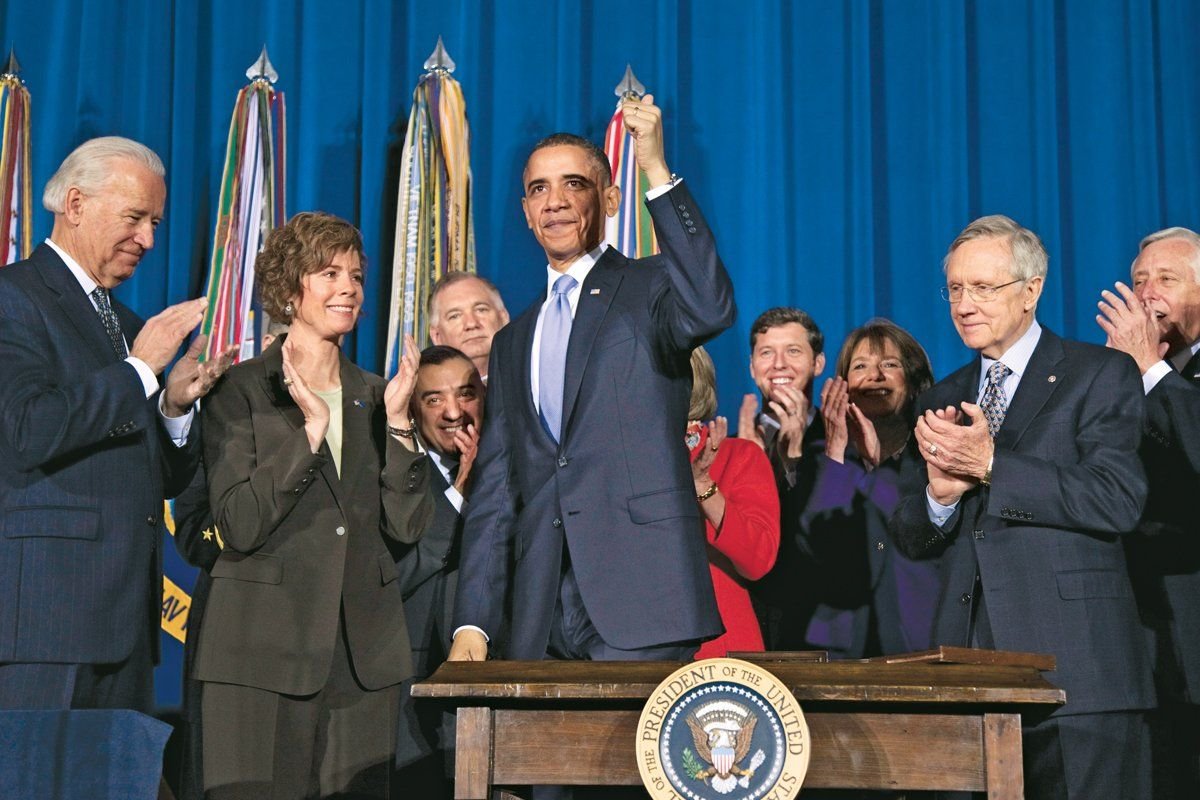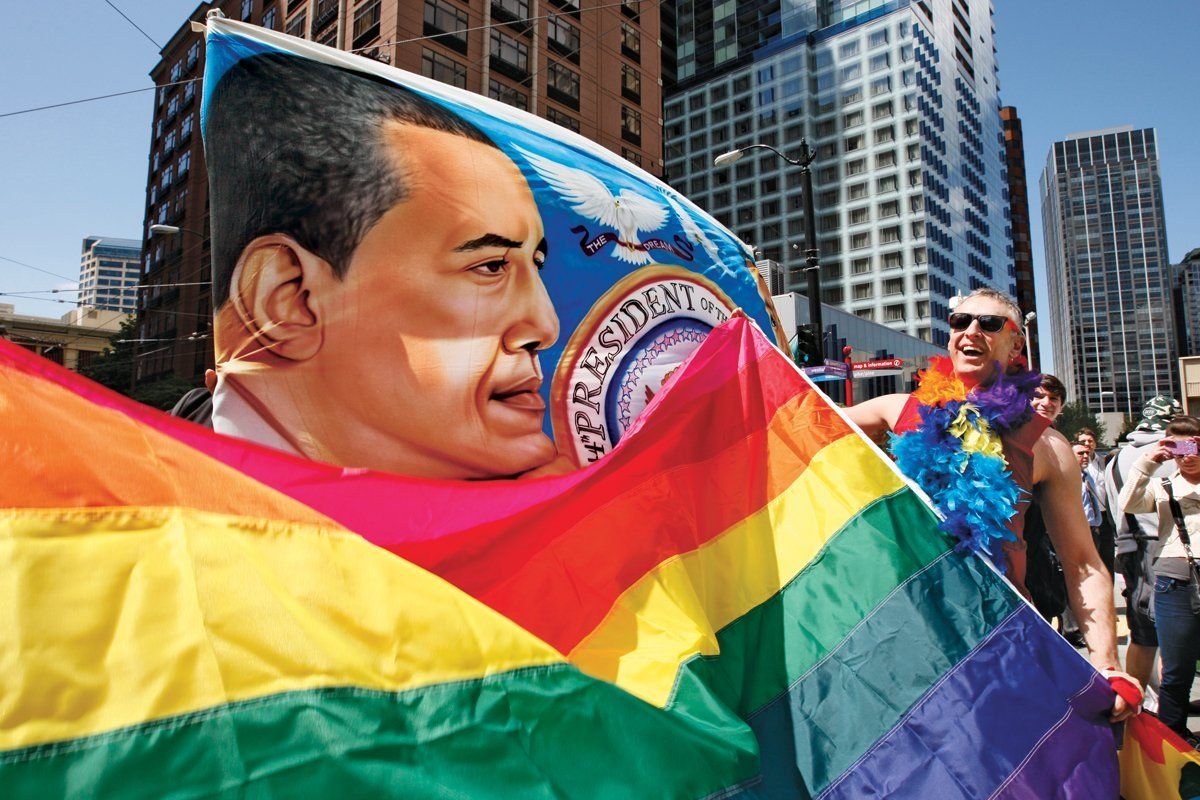
It was the spring of 2007, back when Barack Obama's bid for the presidency seemed quixotic at best. I'd seen Obama speak to a crowd and was impressed but wanted to see if what I'd seen from afar held up under closer scrutiny. So I asked to attend a private fundraiser in a tony apartment in Georgetown. I promised not to write anything. I just wanted to see the man up close and get a better sense of him and his character. At one point in the question-and-answer session, a woman looked him square in the eyes with what can only be called maternal grit. "My son is gay," she said, and the room went suddenly quiet. "I don't understand why you don't support his right to marry the person he loves. It's so disappointing to me." Obama, without losing eye contact for a second, told her: "I want full equality for your son—all the rights and benefits that marriage brings. I really do. But the word 'marriage' stirs up so much religious feeling. I think civil unions are the way to go. As long as they are equal."
My heart sank. Was this obviously humane African-American actually advocating a "separate but equal" solution—a form of marital segregation like the one that made his own parents' marriage a felony in many states when he was born? Hadn't he already declared he supported marriage equality when he was running for the Illinois Senate in 1996? (The administration now claims that the questionnaire from the gay Chicago paper Outlines had been answered in type—not Obama's writing—by somebody else.) Hadn't Jeremiah Wright's church actually been a rare supporter of marriage equality among black churches? The sudden equivocation made no sense—except as pure political calculation. And yet it also felt strained, as if he knew it didn't quite fit. He wanted equality but not marriage—but you cannot have one without the other. On this issue, Obama's excruciating nonposition was essentially "Yes we can't." And yet somehow, simply by the way he answered that mother's question, I didn't believe it. I thought he was struggling between political calculation and his core belief in civil rights. And it was then that I realized he was both: a cold, steely, ruthless, calculating politician who nonetheless wanted to do the right thing in the end.
Last week he did it—in a move whose consequences are simply impossible to judge. White House sources told me that after the interview with ABC News, the president felt as if a weight had been lifted off him. Yes, he was bounced into it by Joe Biden, the lovable Irish-Catholic rogue who couldn't help but tell the truth about his own views on TV (only to be immediately knocked down by David Axelrod on Twitter). But Obama had been planning to endorse gay marriage before his reelection for a while. White House sources say that if Obama had been a state senator in New York last year when the Albany legislature legalized gay marriage, he'd have voted in favor. But no one asked. The "make news" reveal was scheduled for The View. In the end, scrambling to catch up with his veep, he turned to his fellow ESPN fan, Robin Roberts, a Christian African-American from Mississippi, to quell the sudden kerfuffle. Even this was calculated: to have this moment occur between two African-Americans would help Obama calm opposition within parts of the black community.
The interview, by coincidence, came the day after North Carolina voted emphatically to ban all rights for gay couples in the state constitution. For gay Americans and their families, the emotional darkness of Tuesday night became a canvas on which Obama could paint a widening dawn. But I didn't expect it. Like many others, I braced myself for disappointment. And yet when I watched the interview, the tears came flooding down. The moment reminded me of my own wedding day. I had figured it out in my head, but not my heart. And I was utterly unprepared for how psychologically transformative the moment would be. To have the president of the United States affirm my humanity—and the humanity of all gay Americans—was, unexpectedly, a watershed. He shifted the mainstream in one interview. And last week, a range of Democratic leaders—from Harry Reid to Steny Hoyer—backed the president, who moved an entire party behind a position that only a few years ago was regarded as simply preposterous. And in response, Mitt Romney could only stutter.
There was, of course, cold politics behind it. One in six of Obama's fundraising bundlers is gay, and he needs their money. Wall Street has not backed him financially this year the way it did in 2008. A few Jewish donors have held back over Israel. And when Obama announced recently that he would not issue an executive order barring antigay discrimination for federal contractors, the gay donors all but threatened to leave him high and dry. The unity and intensity of the gay power brokers—absent in the defensive crouch of the Clinton years—proved that FDR's maxim still applied: "I agree with you, I want to do it, now make me do it."
If money was one factor making the move necessary, the youth vote—essential to his demographic coalition and overwhelmingly pro–marriage equality—clinched the logic of it. The under-30s were looking worryingly apathetic, especially compared with 2008. This would fire them back up. And by taking a position directly counter to that of Mitt Romney, who favors a constitutional amendment to ban all rights for gay couples across the entire country, Obama advanced his key strategy to winning in the fall: to make this a choice election. If it is a choice election, he wins. If it is a referendum on the last four years of economic crisis, he could lose. And last week, especially after The Washington Post broke the news of Romney's adolescent assault on a gay student, the choice could not have been starker.

The latest Gallup poll, moreover, offered another incentive. Marriage equality is now supported by half of Americans in polls. But more important is the nature of the support. Sixty-five percent of Democrats back marriage equality, compared with only 22 percent of Republicans. But independents favor gay marriage by 57 percent—far closer to the Democrats than the GOP. So it's been confirmed: gay rights is indeed a wedge issue. But now—unlike 2004—it's a wedge issue for the Democrats. Women, too, are more supportive of marriage equality—a further shoring up of the gender gap already widened by the spring's chatter about contraception. Catholics? Whatever the bishops say, Catholics are second only to Jews in their support for gay marriage. Biden speaks for a lot of them.
All these are reasons to be skeptical of Obama's motives, of how long it took, of whether this is pure and late opportunism. But when you step back a little and assess the record of Obama on gay rights, you see, in fact, that this was not an aberration. It was an inevitable culmination of three years of work. He did this the way he always does: leading from behind and playing the long game. He learned from Clinton that tackling this issue up front would only backfire, especially in a recession. So he bided his time. His first step was getting rid of the HIV travel ban, already signed by Bush, but not yet implemented. Again, the process dragged on for months—but the White House insisted it was better to have everything in perfect legal order so the change could not be challenged. It came through.

Then he endured a hazing by gay activists and writers (including me) on his slow pace on gays in the military. But we were wrong. He made the brilliant calculation that he would not push it right away, as Clinton did, and he would not be the front person to advocate the change. Adm. Michael Mullen would do it, backed by Republican Defense Secretary Bob Gates. By bringing the military top brass and Gates slowly on board, he outmaneuvered the Republicans. Even then, he almost ran out of time, but clinched it after the 2010 midterms. He worked our last gay nerves. But when an openly gay solider asked a question at a Republican debate, a photo of a lesbian couple kissing during a Navy homecoming was reprinted around the country, and a Navy veteran asked his Marine boyfriend to marry him in what was the first proposal involving two gay men on a U.S. military base, the sheer scope of the cultural change was astonishing.
On marriage too, Obama and Attorney General Eric Holder had already made the critical decision that the Defense of Marriage Act was unconstitutional on its face, that discrimination against homosexuals warranted heightened legal scrutiny, and that therefore the administration would no longer defend DOMA in court, as it had in its first two years. In other words, by February 2011, Obama and Holder put the significant weight of the Justice Department behind the constitutional logic of marriage equality. Immediately, the lawyers in the Proposition 8 case in California claimed this as a "material" or legally significant development. It was. And, of course, if discriminating against gays in marriage violates the equal-protection clause, as the Justice Department claims, then DOMA is doomed. And in making that decision, Obama did far more to advance marriage equality substantively than he did in his recent interview. To add icing to the cake, Secretary of State Hillary Clinton gave a speech for the first time asserting that, for the United States, gay rights were integral to human rights across the globe, and the U.S. would conduct diplomacy accordingly.
This, by any measure, is an astonishing pace of change in one presidential term. In four years Obama went from being JFK on civil rights to being LBJ: from giving uplifting speeches to acting in ways to make the inspiring words a reality. And he did so by co-opting the forces of resistance—like the military leadership. He fooled most of us much of the time, our outbursts often intemperate—I went on CNN at one point to say that the president had betrayed the gay community on the military ban. We snarked about the "fierce urgency of whenever." Our anger built. And sometimes I wonder if he goaded us into "making him do it." If he did, it worked.
And yet there is something on this subject with Obama that goes deeper in my view than cold, calculating politics and a commitment to civil rights. The core gay experience throughout history has been displacement, a sense of belonging and yet not belonging. Gays are born mostly into heterosexual families and discover as they grow up that, for some reason, they will never be able to have a marriage like their parents' or their siblings'. They know this before they can tell anyone else, even their parents. This sense of subtle alienation—of loving your own family while feeling excluded from it—is something all gay children learn. They sense something inchoate, a separateness from their peers, a subtle estrangement from their families, the first sharp pangs of shame. And then, at some point, they find out what it all means. In the past, they often would retreat and withdraw, holding a secret they couldn't even share with their parents—living as an insider outsider.
And this, in a different way, is Obama's life story as well. He was a black kid brought up by white grandparents and a white single mother in Hawaii and Indonesia, where his color really made no difference. He discovered his otherness when reading an old issue of Life magazine, which had a feature on African-Americans who had undergone an irreversible bleaching treatment to make them look white—because they believed being white was the only way to be happy. He wrote:
I felt my face and neck get hot. My stomach knotted; the type began to blur on the page ... I had a desperate urge to jump out of my seat, to show [others] what I had learned, to demand some explanation or assurance. But something held me back. As in a dream, I had no voice for my newfound fear. By the time my mother came to take me home, my face wore a smile and the magazines were back in their proper place. The room, the air, was quiet as before.

Barack Obama had to come out of a different closet. He had to discover his black identity and then reconcile it with his white family, just as gays discover their homosexual identity and then have to reconcile it with their heterosexual family. The America he grew up in had no space for a boy like him: black yet enveloped by loving whiteness, estranged from a father he longed for (another common gay experience), hurtling between being a Barry and a Barack, needing an American racial identity as he grew older but chafing also against it and over-embracing it at times.
This is the gay experience: the discovery in adulthood of a community not like your own home and the struggle to belong in both places, without displacement, without alienation. It is easier today than ever. But it is never truly without emotional scar tissue. Obama learned to be black the way gays learn to be gay. And in Obama's marriage to a professional, determined, charismatic black woman, he created a kind of family he never had before, without ever leaving his real family behind. He did the hard work of integration and managed to create a space in America for people who did not have the space to be themselves before. And then as president, he constitutionally represented us all.
I have always sensed that he intuitively understands gays and our predicament—because it so mirrors his own. And he knows how the love and sacrifice of marriage can heal, integrate, and rebuild a soul. The point of the gay-rights movement, after all, is not about helping people be gay. It is about creating the space for people to be themselves. This has been Obama's life's work. And he just enlarged the space in this world for so many others, trapped in different cages of identity, yearning to be released and returned to the families they love and the dignity they deserve.
Uncommon Knowledge
Newsweek is committed to challenging conventional wisdom and finding connections in the search for common ground.
Newsweek is committed to challenging conventional wisdom and finding connections in the search for common ground.
About the writer
To read how Newsweek uses AI as a newsroom tool, Click here.








